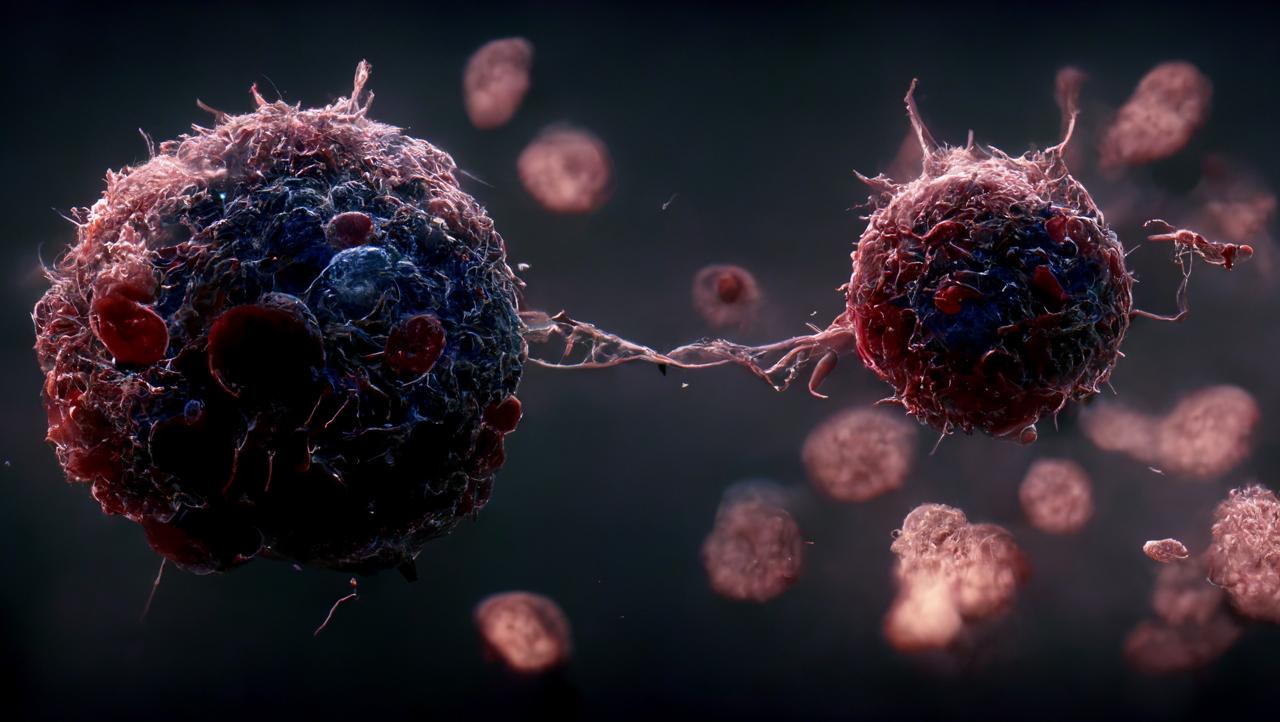Looking for something?
Using CRISPR to Personalize Cancer Immunotherapy Treatment

In 2020, there were an estimated 18.1 million cases of cancer worldwide (excluding non-melanoma skin cancer). Breast, lung, and colorectal cancer were the most common and together contributed to 35.4% of these cases. In the same year, 9.5 million cancer-related deaths were reported. According to the NIH, by 2040, it is expected that there will be 29.5 million new cases per year, with 16.4 cancer-related deaths. Obviously, cancer is a significant health concern and, in many cases, a death sentence.
Recently, in a small clinical trial, 16 people with solid cancers (including breast, lung, and colon cancer) were treated with immune cells whose genes had been altered by CRISPR to add certain cancer-specific immune receptors. This allowed the edited immune cells to recognize and target the individual’s tumor cells, and the edited cells successfully attacked the patients’ tumors. This is incredibly important because tumors have natural defenses against the immune system. The study “demonstrated early proof-of-concept that a patient’s immune system can be reprogrammed to recognize their own cancer.”
The team, led by scientists at PACT Pharma and the University of California, Los Angeles (UCLA), combined two potential methods of treating cancer: engineering a specific type of immune cell called T cells and CRISPR gene editing to create personalized treatment. According to study co-author Antoni Ribas, M.D., Ph.D., and Director of the UCLA Jonsson Comprehensive Cancer Center Tumor Immunology Program, they were “trying to make an army out of a patient’s own T cells” with possibly “the most complicated therapy ever attempted in the clinic.”
The Human Body’s Natural Approach to Fighting Cancer
T cells are one of the primary types of lymphocytes that are vital in the adaptive immune response. They have many functions, one of which is recognizing, binding to, and destroying specific antigens. The T cell receptor “can distinguish single point mutations in the cancer genome that change the amino acid sequences of peptides presented by the major histocompatibility complex (MHC) on the cancer cell surface” (1).
Although T cells can and often do destroy cancer cells, a person may not have enough T cells to effectively eliminate the cancer. Additionally, cancers (especially solid tumors) are incredibly efficient at avoiding immune system elimination.
In addition to other immune escape mechanisms, solid tumors create a physical barrier to T cells and also create an immunosuppressive microenvironment that renders T cells less functional as they near the tumor. Now, therapies are being developed that work around cancer’s defenses.
CAR T and TCR-T Therapies – Revolutionary Approaches to Treating Cancer
Chimeric antigen receptor (CAR) T cell therapy has been approved by the FDA to treat certain types of blood cancer. In CAR T cell therapy, T cells are obtained from the patient, then engineered to express artificial CARs. The modified T cells are injected into the bloodstream, where they can identify and attach to a specific protein found on some types of cancer cells and destroy the cancerous cells. They do not need antigen presenting cells, as the modified T cells bypass the need for T cell and receptor matching.
However, due to the physical barrier and the fact that there are no surface proteins common to solid tumors, T cells must infiltrate the tumor in order to kill the cancer cells. This means that CAR T cells cannot be engineered to treat solid tumors. Instead, a treatment must be found that can be personalized for an individual person’s tumor.
Enter T-cell receptor engineered T cell (TCR-T) therapy. TCR-T therapy also involves the modification of a patient’s T cells in the lab. In contrast to CAR T, which creates man-made receptors that target common surface proteins, TCR-T causes the T cells to express T cell receptors (TCRs) that recognize combinations of specific peptides and human leukocyte antigens (HLA). This allows TCR-T cells to recognize specific tumor associated antigens so they can eliminate the individual’s tumor cells (2).
Certain antigens (neoantigens that are generated by mutations in tumor cells and mutated antigens) are only expressed in tumors, making them safe targets for TCR-T therapy (2).
Harnessing CRISPR and the Power of TCR-T Therapy
The innovative new therapy, called NeoTCR-P1, is a personalized autologous T cell therapy that combines TCR replacement therapy with CRISPR to treat solid tumors. NeoTCR-P1 was evaluated in PACT-0101, a phase 1 first-in-human, multi-center, dose-escalation trial (NCT03970382). The primary endpoints were to evaluate safety and tolerability while determining a maximum tolerated dose and evaluating manufacturing feasibility.
“This study demonstrates the feasibility of isolating and cloning multiple immune cell receptors recognizing mutations in cancer cells, the simultaneous knock-out of the endogenous immune receptor and knock-in of the redirecting immune receptor using single-step, nonviral precision genome editing, the manufacturing of CRISPR engineered T cells at clinical grade, the safety of infusing up to three gene-edited immune cell products, and the ability of the gene-edited immune cells to traffic to the patients’ tumors,” Ribas explained.
Developing this therapy involved a very complicated design and manufacturing process, and here is a broad overview of some steps involved. First, the team sequenced DNA from the blood and tumors of each person in the trial, looking for mutations specific to each person’s tumor (that were not also found in the blood). Then, using algorithms, they predicted which mutations could provoke a T cell response for the tumor and created personalized libraries of hundreds of neoantigen peptide sequences. After a series of analyses, they designed and assessed T cell receptors (TCRs) that would recognize the specific mutations (1).
The team then took blood samples to isolate each patient’s T cells and used CRISPR to knockout two existing TCR genes and replace them with a gene encoding one cancer specific receptor into the T cells. Then, the T cells were expanded to large numbers (1).
Each participant received conditioning chemotherapy to reduce the number of T cells in their body before receiving the edited T cells. The edited cells were then infused back into the patient, where they redirected the immune system to recognize the cancer. Patients received between one and three distinct neoTCR T cell products, although all received the same total number of gene-edited cells at a given dose level (1).
28 days post-infusion, five patients had stable disease, with two of these having decreased size of some target lesions, while 11 had disease progression (1). Although efficacy was low, relatively small doses were used to establish whether the approach was safe, and better results may be seen with a higher dose (3).
The approach was successful as the edited T cells were found in higher concentrations near the tumors than non-edited T cells had been prior to treatment. In addition, biopsies showed that, in some cases, the altered cells represented up to 20% of the immune cells in the tumor (1).
All patients experienced expected side effects due to the lymphodepletion conditioning regimen. Two of the 19 experienced toxic events that were possibly due to the neoTCR-transgenic T cell therapy, one with a grade 1 cytokine release syndrome (CRS). The other experienced grade 3 encephalitis that caused difficulty walking, tremors, and difficulty writing on day 7 post-infusion, which was treated with high-dose corticosteroids for four days, and all symptoms resolved (1).
This is an exciting development in the fight against cancer and has the potential to greatly improve a person’s odds of surviving a cancer diagnosis. Perhaps even better, Stefanie Mandl, Ph.D., the chief scientific officer at PACT Pharma, explained that the therapy is broadly applicable due to their “proprietary catalogue of 64 human leukocyte antigens (HLAs), which cover patients of all ethnicities. This is a key differentiator from most current TCR T cell therapies that are limited to only a single HLA molecule that is common in Caucasians.”
References:
- Foy, S.P., Jacoby, K., Bota, D.A. et al.Non-viral precision T cell receptor replacement for personalized cell therapy. Nature (2022). https://doi.org/10.1038/s41586-022-05531-1
- Liu Y, Yan X, Zhang F, Zhang X, Tang F, Han Z, Li Y. TCR-T Immunotherapy: The Challenges and Solutions. Front Oncol. 2022 Jan 25;11:794183. doi: 10.3389/fonc.2021.794183. PMID: 35145905; PMCID: PMC8822241.
- Ledford H. CRISPR cancer trial success paves the way for personalized treatments. Nature. 2022 Nov;611(7936):433-434. doi: 10.1038/d41586-022-03676-7. PMID: 36357583.
“The views, opinions, findings, and conclusions or recommendations expressed in these articles and highlights are strictly those of the author(s) and do not necessarily reflect the views of the Oligonucleotide Therapeutics Society (OTS). OTS takes no responsibility for any errors or omissions in, or for the correctness of, the information contained in these articles. The content of these articles is for the sole purpose of being informative. The content is not and should not be used or relied upon as medical, legal, financial, or other advice. Nothing contained on OTS websites or published articles/highlights is intended by OTS or its employees, affiliates, or information providers to be instructional for medical diagnosis or treatment. It should not be used in place of a visit, call, consultation, or the advice of your physician or other qualified health care provider. Always seek the advice of your physician or qualified health care provider promptly if you have any healthcare-related questions. You should never disregard medical advice or delay in seeking it because of something you have read on OTS or an affiliated site.”








